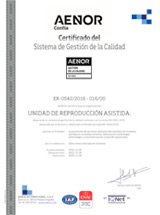Genetic causes and treatment
The fundamental causes related to RA are genetic factors and antiphospholipid syndrome. Genetic abnormalities and chromosomal alterations in the embryo account for 50% of miscarriages. Maternal age is the most common cause of infertility, as the older the mother, the lower the quality and quantity of oocytes.
The Vistahermosa Reproduction Unit carries out the study of the embryo with the advanced Preimplantational Genetic Diagnosis, as well as the analysis of the chromosomes to qualify them and select the optimum ones or the woman’s implantation capacity for the development of the pregnancy to term.
The Preimplantational Genetic Test is a set of state-of-the-art techniques in which a genetic study of the embryo is carried out before its implantation in the mother’s uterus, with the aim of selecting those embryos free of chromosomal alterations.
The karyotypes of the male and female are used to find out if there is any structural alteration in any of the chromosomes that predisposes to miscarriage. In the male, tests such as FISH are carried out, which allows the visualisation, distinction and study of the chromosomes and any anomalies they may present, as well as sperm DNA fragmentation.
In women, image analysis through hysterosalpingography, ultrasound or hysteroscopy to study the anatomy of the uterus allows the presence of malformations such as a uterine cavity divided into two parts by a central septum, myomas, polyps, fibroids, scar tissue adhesions or cervical insufficiency, which occurs when the cervix is unable to support pregnancy, opening prematurely and causing miscarriage.











